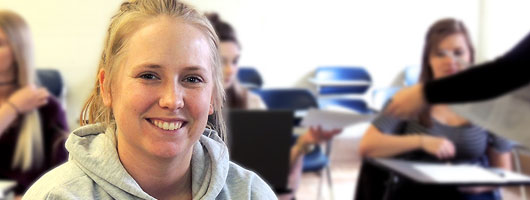 Pictured | Kaitlin Dougherty | Health Sciences | Osceola, Indiana (hometown)
Pictured | Kaitlin Dougherty | Health Sciences | Osceola, Indiana (hometown)
Bachelor of Science in Health Sciences
with a concentration in Rehabilitative Sciences
The Bachelor of Science (BS) in Health Sciences with a concentration in Rehabilitative Sciences prepares students for many different types of careers in sport and exercise sciences, health and fitness, as well as preparing students to apply to graduate programs in Occupational or Physical Therapy. Students will have the ability to engage in their field of study through internships and experiential learning with local healthcare organizations. Students majoring in The Bachelor of Sciences in Health Sciences with a concentration in Rehabilitative Sciences can pursue certification, apply for a variety of healthcare jobs, and purse graduate education in fields such as: sports medicine, exercise and kinesiology, sport and fitness administration, occupational and physical therapy, and personal training.
Rehabilitative Sciences Objectives
To be able to fulfill the requirements of a Bachelor Degree in Health Sciences with a concentration in Rehabilitative Sciences and promote the overall program goals, graduates of the Health Sciences degree at Indiana University South Bend will be able to:
- Design improvement plans for health and fitness
- Analyze aggregate exercise data to inform individuals and special populations of plans for health and fitness
- Evaluate exercise outcomes in both health and special populations
Academic Advising
College policy on advising requires that students meet with their academic advisors at least once each year, and in some departments, prior to each semester’s to enrollment. Advising holds are placed on all Vera Z. Dwyer College of Health Sciences students prior to advance registration and are released following advising appointments. Students with a declared major are advised in their academic units. To determine who your advisor is and how to contact them, see One.IU.
Degree Requirements (120 cr.)
Students receiving the Bachelor of Science in Health Sciences with a concentration in Health Promotion must complete 120 credits including:
- IU South Bend Dwyer College of Health Sciences Campuswide General Education Curriculum (40 cr.)
- Biological, Life, and Social Sciences Requirements (44 cr.)
- Major Requirements (36 cr.)
- Free Electives (balance of credits needed to equal 120 cr. requirement)
- A minimum of 30 credit hours at the 300- or 400-level.
- Courses required for the major must be completed with a grade of C or higher.
- A minimum CGPA of 2.0 is required.
Biological, Life, and Social Sciences Requirements (44 cr.)
All courses are 3 cr., unless otherwise designated
- AHLT-R 185 Medical Terminology (2 cr.)
- CHEM-C 105 Principles of Chemistry I
- CHEM-C 106 Principles of Chemistry II
- CHEM-C 125 Experimental Chemistry I (2 cr.)
- CHEM-C 126 Experimental Chemistry II (2 cr.)
- MATH-M 215 Calculus I (5 cr.)
- PHSL-P 261 Human Anatomy and Physiology I (5 cr.)
- PHSL-P 262 Human Anatomy and Physiology II (5 cr.)
- PHYS-P 201 General Physics 1 (5 cr.)
- PHYS-P 202 General Physics 2 (5 cr.)
- PSY-P 103 General Psychology
- PSY-P 216 Life Span Developmental Pscyology
- PSY-P 324 Abnormal Psychology
Major Requirements (36 cr.)
All courses are 3 cr., unless otherwise designated
Health Sciences Core (12 cr.)
The Health Sciences Core will begin with Introduction to Health Sciences. This will be taken along with the General Education courses and introduce students to Health Systems. All Health Sciences students will take the 12-33 credit hours of the Health Sciences core depending on the concentration.
After the first two years of General Education, students will determine which of the Health Sciences Concentrations they will complete the following courses:
- HSC-A 291 Service Learning in Health Sciences I OR
HSC-A 491 Service Learning in Health Sciences II - HSC-H 101 Introduction to Health Sciences
- HSC-H 411 Psychosocial Behavior Modeling for Fitness and Health
- HSC-W 314 Ethics and Health Professionals
Rehabilitative Sciences Concentration Core (24 cr.)
Students should see their advisor for specific courses for the Rehabilitative Sciences concentration.
Photo credit | Teresa Sheppard